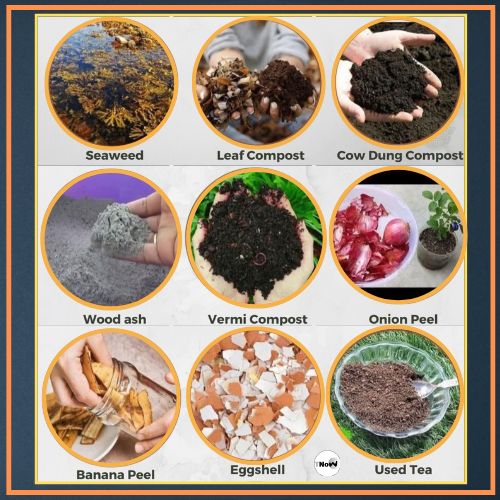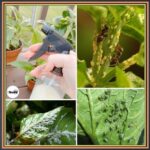1. Banana Peel – Potassium Boost for Strong Roots and Flowers
How to Use:
- Chop banana peels into small pieces and bury them near the base of plants.
- You can also blend them with water to make a natural fertilizer spray.
Benefits:
Boosts potassium levels, strengthens roots, and encourages flowering.
2. Eggshell – A Natural Source of Calcium
How to Use:
- Wash and dry eggshells, then crush them into a fine powder.
- Sprinkle directly into the soil or mix with compost.
Benefits:
Provides calcium to prevent blossom-end rot in tomatoes, peppers, and eggplants.
3. Used Tea Leaves – Improves Soil Structure
How to Use:
- Collect used tea leaves, dry them, and mix with potting soil.
- Avoid using tea with sugar or milk.
Benefits:
Enriches soil with nitrogen and improves its texture.
4. Wood Ash – Supplies Potassium and Balances pH
How to Use:
- Sprinkle a thin layer of wood ash around the base of plants.
- Mix into compost for added nutrients.
(Avoid using too much as it can raise soil pH excessively.)
Benefits:
Increases potassium, neutralizes acidic soil, and supports healthy plant growth.
5. Vermi Compost – Nutrient-Rich Fertilizer
How to Use:
- Add a 1–2 inch layer of vermicompost to the topsoil of pots or garden beds.
- Mix it with regular soil for potting new plants.
Benefits:
Provides balanced nutrients, improves soil structure, and boosts microbial activity.
6. Onion Peel – Packed with Potassium and Antioxidants
How to Use:
- Soak onion peels in water overnight to make a natural fertilizer tea.
- Pour the onion peel water directly into the soil.
Benefits:
Rich in potassium, antioxidants, and minerals that improve plant health.
7. Seaweed – Natural Growth Stimulator
How to Use:
- Wash fresh seaweed to remove salt, then chop and add to compost.
- Alternatively, soak dried seaweed in water for a few days to make liquid fertilizer.
Benefits:
Provides micronutrients and natural growth hormones that boost plant development.
8. Leaf Compost – Organic Matter for Healthy Soil
How to Use:
- Collect fallen leaves, shred them, and pile them up to decompose.
- After 3–6 months, use as mulch or mix into soil.
Benefits:
Improves soil fertility, retains moisture, and increases earthworm activity.
9. Cow Dung Compost – The Classic All-Round Fertilizer
How to Use:
- Always use well-decomposed cow dung compost.
- Mix into soil before planting or apply as top-dressing around plants.
Benefits:
Rich in nitrogen, phosphorus, and potassium; enhances soil fertility and plant growth.
These 9 natural fertilizers are eco-friendly, budget-friendly, and safe for your plants. Instead of relying on chemicals, try these organic methods to give your garden a healthier and greener future.


